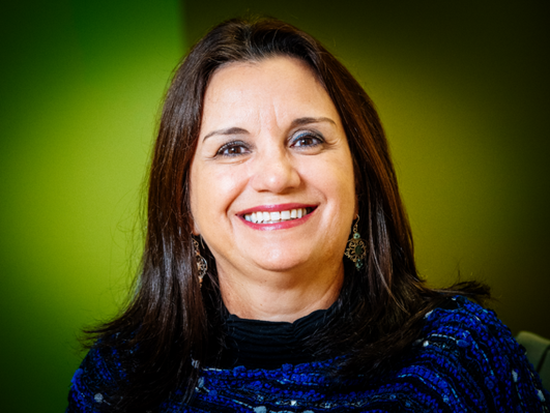 Isabel Scarinci, Ph.D.,
Isabel Scarinci, Ph.D.,
Photography: Steve WoodThe University of Alabama at Birmingham’s Isabel Scarinci, Ph.D., vice chair for Global and Rural Health in the Department of Obstetrics and Gynecology, was chosen to lead a workgroup charged with creating the United States cervical cancer elimination plan.
The announcement was made during the Biden Cancer Moonshot forum at the White House, where leaders from across health care, government, research and other divisions came together to discuss the challenges of increasing access to cervical cancer prevention and control services across the nation.
“I am honored with the opportunity to lend my expertise and life experiences to such an important effort,” said Scarinci, who is also the senior adviser for Global Cancer at the O’Neal Comprehensive Cancer Center at UAB. “My dedication to cervical cancer elimination is both personal and professional as I truly believe we can eliminate this cancer in my lifetime, as we have done with polio.”
Scarinci says the American Cancer Society and other organizations have paved the way through the establishment of the national HPV roundtable, national cervical cancer roundtable and the Cancer Moonshot initiative. Her workgroup will represent the intersection of these groups, as well as the engagement of other individuals and organizations, toward the development of a national road map for the elimination of cervical cancer as a public health threat in the United States.
Last May, UAB, in partnership with the Alabama Department of Public Health, TogetHER for Health, Rotary Club of Birmingham, Quality of Life Health Services and the American Cancer Society, launched Operation Wipeout — a statewide action plan to eliminate cervical cancer as a public health problem in Alabama. Scarinci hopes the lessons learned in Alabama over the past year can accelerate the action toward cervical cancer elimination at the national level.
“Most of the major accomplishments I have seen in my lifetime have been achieved through partnerships and people working together, so I look forward to engaging a very diverse group of individuals in this mission by sharing ideas, talents, expertise and commitment,” she said.
To learn more about the statewide action plan to eliminate cervical cancer, click here.